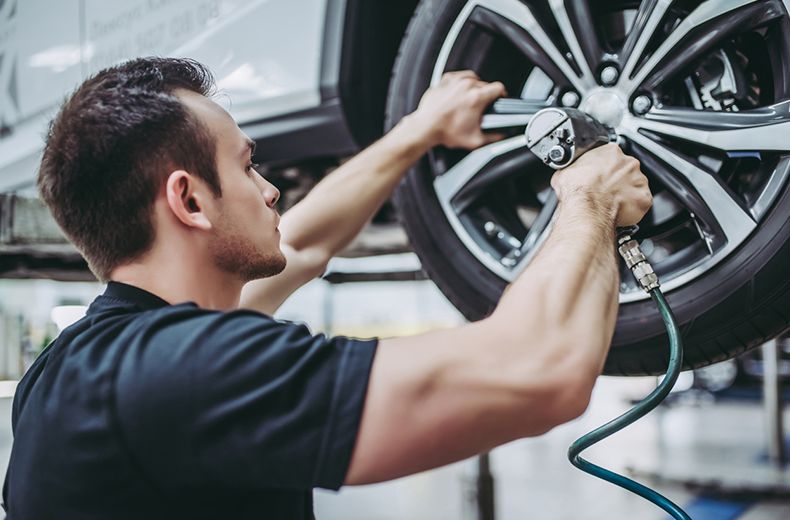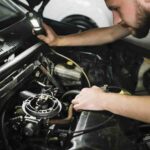
Car servicing is a crucial aspect of vehicle ownership that ensures your car runs smoothly, efficiently, and safely. Regular maintenance helps prevent unexpected breakdowns, extends the lifespan of your vehicle, and maintains its resale value. To make the most of your car servicing appointment, it’s important to understand what should be included. In this comprehensive guide, we’ll explore the key components that should be part of your car servicing
Also Read- Audi Service and Repair Centre in Delhi
- Oil Change: Regular oil changes are fundamental to engine health. Engine oil lubricates moving parts, reduces friction, and helps dissipate heat. During a typical car service, the mechanic will drain the old oil, replace the oil filter, and refill the engine with fresh oil. The type of oil used may vary depending on your car’s make and model.
- Fluid Checks and Top-Ups: In addition to engine oil, other fluids need attention. These include transmission fluid, brake fluid, power steering fluid, and coolant. Regularly checking and topping up these fluids can prevent major issues and maintain your car’s overall performance.
- Brake Inspection: The braking system is critical for your safety. During servicing, the mechanic will inspect the brake pads, rotors, calipers, and brake lines. If any components are worn out or damaged, they will be replaced to ensure optimal braking performance.
- Tire Inspection and Rotation: Tires are essential for road grip and overall vehicle stability. Regular inspections include checking tire pressure, tread depth, and overall condition. Proper tire rotation helps ensure even wear and extends tire life.
- Air Filter Replacement: The air filter prevents contaminants from entering the engine. A clogged air filter can reduce engine performance and fuel efficiency. Replacing the air filter during servicing helps maintain clean airflow to the engine.
- Cabin Air Filter Replacement: The cabin air filter ensures the air you breathe inside the car is clean. A dirty or clogged cabin air filter can lead to poor air quality and decreased HVAC system efficiency. Replacing this filter ensures comfort and health while driving.
- Spark Plug Inspection/Replacement: Spark plugs play a crucial role in igniting the air-fuel mixture in the engine. Over time, they can wear out and affect engine performance. The mechanic will inspect and replace spark plugs if necessary.
- Battery Check: A healthy battery is essential for starting your car reliably. During servicing, the technician will inspect the battery, terminals, and cables. If the battery is weak or showing signs of corrosion, it may need to be replaced.
- Exhaust System Inspection: A well-functioning exhaust system is vital for emissions control and engine performance. During servicing, the mechanic will check for leaks, damaged components, or excessive rust and address any issues.
- Suspension and Steering Check: The suspension and steering components are crucial for a smooth and stable ride. Mechanics will inspect shocks, struts, ball joints, tie rods, and other parts for wear and tear. Proper alignment and suspension maintenance ensure safety and handling.
- Belts and Hoses Inspection: Timing belts, serpentine belts, and various hoses are critical for engine operation. These components deteriorate over time, so they need regular inspection and replacement to avoid engine damage or breakdowns.
- Lights and Electrical Systems: Ensuring all lights (headlights, taillights, turn signals, etc.) work correctly is essential for safety. The car servicing includes checking and replacing bulbs or addressing any electrical issues.
- Wheel Alignment: Proper wheel alignment ensures even tire wear, improves handling, and reduces fuel consumption. Technicians will adjust the alignment if necessary to keep your car driving straight and true.
- Computer Diagnostics: Modern cars are equipped with complex computer systems that monitor various aspects of vehicle performance. Mechanics will use diagnostic tools to check for error codes and address any electronic or sensor-related issues.
- Road Test: After completing all the necessary checks and replacements, a road test is typically performed to ensure that the car is running smoothly and that all issues have been addressed.
- Maintenance Schedule Review: Lastly, your service provider should provide you with a maintenance schedule tailored to your car’s make and model. This schedule outlines when specific services should be performed in the future, helping you stay on top of your vehicle’s needs.
It is important to follow your manufacturer’s recommended service intervals and find a reliable mechanic or service center to ensure that all these essential elements of car servicing are properly addressed. Taking care of your car through regular servicing is an investment in its longevity and your safety on the road.
In conclusion, a comprehensive car servicing should include a thorough examination of various components, from the engine to the brakes and everything in between. Regular servicing not only keeps your vehicle running smoothly but also enhances safety, extends its lifespan, and helps maintain its value.
Table of Contents
Ashish
Deepa is the Brand Manager of wheelforcecentre.








